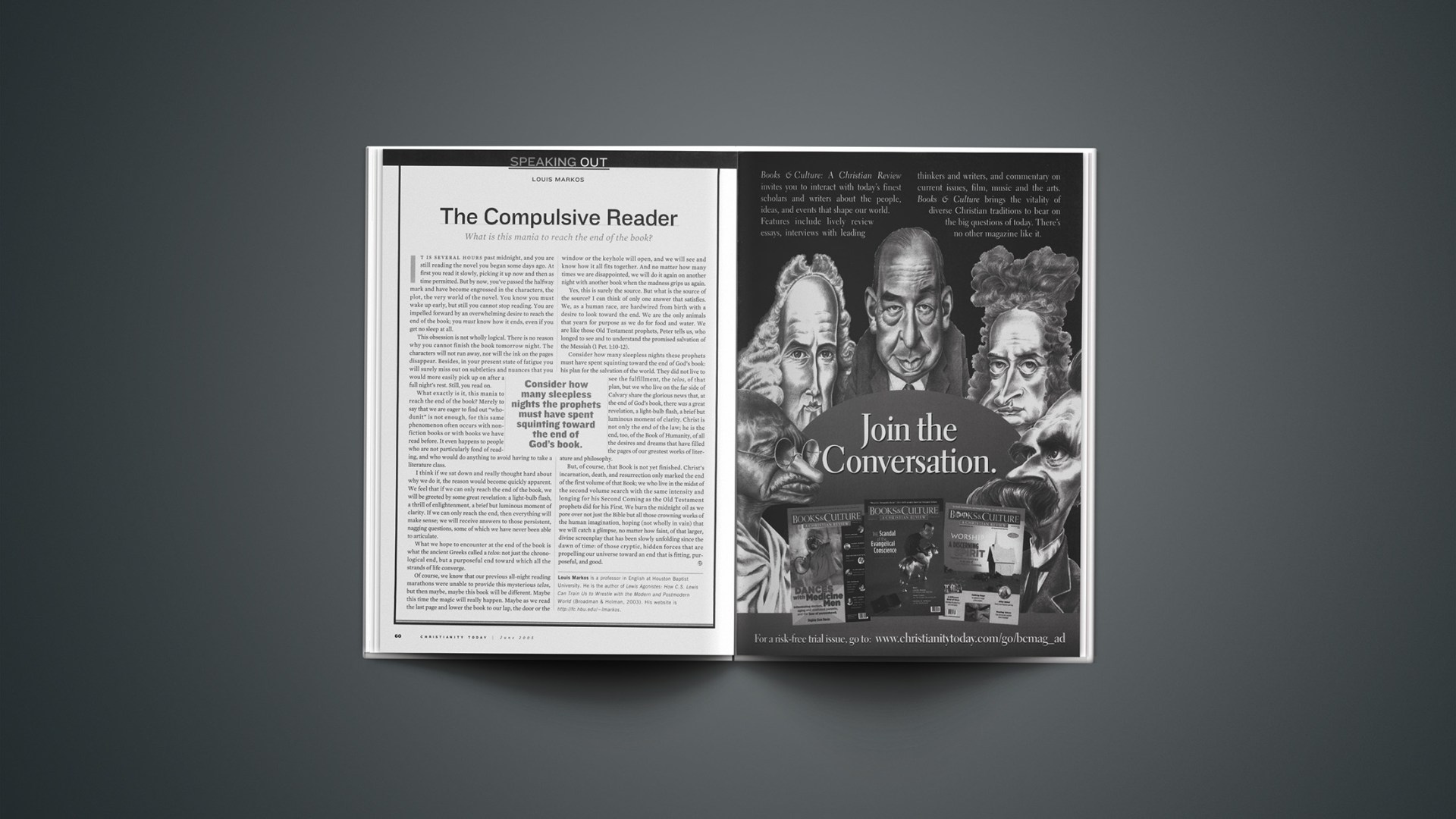It is several hours past midnight, and you are still reading the novel you began some days ago. At first you read it slowly, picking it up now and then as time permitted. But by now, you’ve passed the halfway mark and have become engrossed in the characters, the plot, the very world of the novel. You know you must wake up early, but still you cannot stop reading. You are impelled forward by an overwhelming desire to reach the end of the book; you must know how it ends, even if you get no sleep at all.
This obsession is not wholly logical. There is no reason why you cannot finish the book tomorrow night. The characters will not run away, nor will the ink on the pages disappear. Besides, in your present state of fatigue you will surely miss out on subtleties and nuances that you would more easily pick up on after a full night’s rest. Still, you read on.
What exactly is it, this mania to reach the end of the book? Merely to say that we are eager to find out “whodunit” is not enough, for this same phenomenon often occurs with nonfiction books or with books we have read before. It even happens to people who are not particularly fond of reading, and who would do anything to avoid having to take a literature class.
I think if we sat down and really thought hard about why we do it, the reason would become quickly apparent. We feel that if we can only reach the end of the book, we will be greeted by some great revelation: a light-bulb flash, a thrill of enlightenment, a brief but luminous moment of clarity. If we can only reach the end, then everything will make sense; we will receive answers to those persistent, nagging questions, some of which we have never been able to articulate.
What we hope to encounter at the end of the book is what the ancient Greeks called a telos: not just the chronological end, but a purposeful end toward which all the strands of life converge.
Of course, we know that our previous all-night reading marathons were unable to provide this mysterious telos, but then maybe, maybe this book will be different. Maybe this time the magic will really happen. Maybe as we read the last page and lower the book to our lap, the door or the window or the keyhole will open, and we will see and know how it all fits together. And no matter how many times we are disappointed, we will do it again on another night with another book when the madness grips us again.
Yes, this is surely the source. But what is the source of the source? I can think of only one answer that satisfies. We, as a human race, are hardwired from birth with a desire to look toward the end. We are the only animals that yearn for purpose as we do for food and water. We are like those Old Testament prophets, Peter tells us, who longed to see and to understand the promised salvation of the Messiah (1 Pet. 1:10-12).
Consider how many sleepless nights these prophets must have spent squinting toward the end of God’s book: his plan for the salvation of the world. They did not live to see the fulfillment, the telos, of that plan, but we who live on the far side of Calvary share the glorious news that, at the end of God’s book, there was a great revelation, a light-bulb flash, a brief but luminous moment of clarity. Christ is not only the end of the law; he is the end, too, of the Book of Humanity, of all the desires and dreams that have filled the pages of our greatest works of literature and philosophy.
But, of course, that Book is not yet finished. Christ’s incarnation, death, and resurrection only marked the end of the first volume of that Book; we who live in the midst of the second volume search with the same intensity and longing for his Second Coming as the Old Testament prophets did for his First. We burn the midnight oil as we pore over not just the Bible but all those crowning works of the human imagination, hoping (not wholly in vain) that we will catch a glimpse, no matter how faint, of that larger, divine screenplay that has been slowly unfolding since the dawn of time: of those cryptic, hidden forces that are propelling our universe toward an end that is fitting, purposeful, and good.
Louis Markos is a professor in English at Houston Baptist University. He is the author of Lewis Agonistes: How C.S. Lewis Can Train Us to Wrestle with the Modern and Postmodern World (Broadman & Holman, 2003). His website is fc.hbu.edu/~lmarkos.
Copyright © 2005 Christianity Today. Click for reprint information.
Related Elsewhere:
Louis Markos’s website is available from Houston Baptist University.
For book lovers, see our book awards for 2005, 2004, 2003, 2002, 2001, 2000, 1999, 1998, and 1997, as well as our Books of the Twentieth Century. For other coverage or reviews, see our Books archive and the weekly Books & Culture Corner.
Other Christianity Today articles by Markos include:
Poetry-Phobic | Why evangelicals should love language that is ‘slippery.’ (Oct. 11, 2001)
Myth Matters | C. S. Lewis bequeathed us a method and a language for sharing the gospel with the modern and postmodern world. (April 17, 2001)










